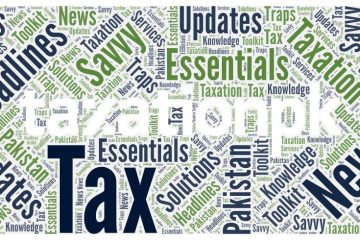For overseas Pakistanis considering selling property back home, there’s potentially good news regarding capital gains tax. It’s often stated that overseas Pakistanis enjoy a 100% waiver on this tax, meaning they pay nothing. While enticing, this isn’t automatically true and hinges on fulfilling specific conditions. This article clarifies the situation, explaining the conditions for this tax exemption and the underlying legal framework.
Navigating Property Taxes in Pakistan: Beyond the Basics
When selling property in Pakistan, it’s crucial to understand the different taxes involved. Beyond standard charges like stamp duty or registration fees, income tax is a significant consideration. Specifically, within income tax, there are two key components when selling property:
- Section 236C Tax (Transaction Tax): This is a tax levied on the transaction itself, at the time of sale. Currently, this rate is 3% for filers, late filers, and non-filers, including overseas Pakistanis. While often referred to as a fixed tax, there are mechanisms for potential relief, but it’s generally considered a minimum tax payable at the point of sale.
- Capital Gains Tax (CGT): This tax is levied on the profit you make from selling the property. It’s calculated on the difference between your sale price and your original purchase price. For local Pakistanis, the standard Capital Gains Tax rate is 15% on profits from properties purchased after July 2024, regardless of how long they’ve been held. This marked a change from previous rules where longer holding periods could reduce or eliminate CGT.
The Promise of Zero Capital Gains Tax: Conditions Apply
While local Pakistanis generally face this 15% Capital Gains Tax on property profits, overseas Pakistanis can potentially achieve a 0% rate. However, this isn’t automatic. To qualify for this exemption, you must meet three key conditions:
The Three Pillars of Exemption:
- Status as a NICOP or POC Holder: You must be a Non-resident Pakistani holding a National Identity Card for Overseas Pakistanis (NICOP) or a Pakistan Origin Card (POC). This confirms your status as an overseas Pakistani in the eyes of the law.
- Property Purchase Method Matters: This is the most crucial and often overlooked condition. The way you initially purchased the property significantly impacts your CGT liability at the time of sale. To qualify for the 0% exemption, the funds used to purchase the property must have been remitted to Pakistan through specific banking channels. Purchases made using funds from regular Pakistani Rupee accounts may not qualify for the exemption.
- Utilizing Specific Account Types for Remittance: The funds for the property purchase must have been sent to Pakistan and routed through either of these two account types:
- Foreign Currency Value Account: This is a specific type of account designed for foreign currency holdings.
- Non-Resident Rupee Value Account: This is a special Rupee account specifically for non-resident Pakistanis.
- (Roshan Digital Account): While not explicitly mentioned in the primary legal sections initially discussed, Roshan Digital Accounts are also generally understood to qualify for this exemption as they are designed to facilitate foreign remittances by overseas Pakistanis.
Why These Conditions? Encouraging Remittances and Formal Channels
These conditions are not arbitrary. The Pakistani government incentivizes overseas Pakistanis to send remittances through formal banking channels and invest in the country. By channeling property purchase funds through Foreign Currency or Non-Resident Rupee Value accounts, you are bringing foreign currency into Pakistan, which benefits the national economy. In return for this contribution, the government offers the significant benefit of Capital Gains Tax exemption upon selling that property.
Illustrative Example
Imagine you, an overseas Pakistani with a NICOP, purchased a property in Pakistan in September 2024 for 10 million Rupees. You funded this purchase by remitting funds from your overseas account to a Non-Resident Rupee Value account in Pakistan, and then used those funds to buy the property. Years later, in 2028, you sell the same property for 20 million Rupees, making a profit of 10 million Rupees.
- If you met the three conditions, particularly condition number 3 regarding the account type used for purchase, you would likely be exempt from the 15% Capital Gains Tax on your 10 million Rupee profit. You would still pay the 3% Section 236C tax at the time of sale.
- However, if you purchased the property using funds from a regular Pakistani Rupee account (perhaps funds already in Pakistan or not remitted through the specified channels), you might not qualify for the 0% CGT and could be liable for the 15% Capital Gains Tax on your profit, in addition to the 236C tax.
Plan Ahead: Purchase with Sale in Mind
The crucial takeaway is that tax planning needs to happen at the time of purchase, not sale. If you are an overseas Pakistani intending to benefit from the 0% Capital Gains Tax exemption when you eventually sell your property, you must ensure your initial purchase is funded through a Foreign Currency Value Account or a Non-Resident Rupee Value Account (or Roshan Digital Account).
Where to Verify the Rules
For precise legal details, refer to the Income Tax Ordinance of Pakistan, specifically Section 236C and related sections. You can find the Income Tax Ordinance online and consult page 480 (or search for relevant sections as page numbers may vary in different editions). Furthermore, for information on opening Foreign Currency Value Accounts and Non-Resident Rupee Value Accounts, visit the websites of the State Bank of Pakistan and commercial banks operating in Pakistan.
Conclusion: Informed Decisions for Tax-Efficient Property Transactions
Understanding these conditions is vital for overseas Pakistanis engaging in property transactions in Pakistan. By adhering to the specified requirements, particularly regarding the method of funding your property purchase, you can potentially unlock significant tax savings and benefit from the 0% Capital Gains Tax exemption. Always ensure you consult with tax advisors and refer to the most up-to-date legal and financial information to make informed decisions about your property investments and sales in Pakistan.




